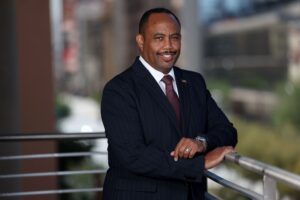When Dean Battinto L. Batts Jr. talks about journalism’s future, he’s not just drawing on his experience at Arizona State University’s Walter Cronkite School of Journalism and Mass Communication. He’s also hearkening back to his youth, growing up in a small college town in Virginia with two educator parents who believed knowledge and community were inseparable.
“My life has been shaped by two things – and that’s education and journalism,” Batts said when he sat down with NEWSWELL to discuss ASU’s new Knight Center for the Future of News.
Today, he’s focused on protecting journalism during a critical time for the industry. Audiences are fragmented, trust in media is eroding, and artificial intelligence is transforming how information spreads, sometimes with dangerous consequences.
“We find ourselves at an inflection point,” Batts said. “People’s consumption habits and where they’re getting our information has dispersed.”
“There is sort of a crisis of trust,” he added. “And artificial intelligence and technology hasten the need to confront trust, to confront mis- and disinformation.”

Now, with the support of a $10.5 million grant from the Knight Foundation – the largest in the Cronkite School’s history – Batts and the school are launching the Knight Center for the Future of News. He envisions it as a way to connect the industry’s past to its next chapter, explaining that “we have to be engineers, and we’re building two bridges.”
He said the first bridge is from legacy media to current or emerging media, the second is a bridge into the future so everyone can move forward.
For Batts, that future starts with listening to communities. “It’s more about what would you all like to see? How are you engaging with information? And then build from there,” he said. “So it’s more reverse engineering.”
The Knight Center’s goal is to transform research into practical tools newsrooms can use right away, not years from now. Batts envisions rapid experiments tested in real news environments that will help journalists navigate changes in technology, audience behavior and business models.
A key part of that vision is NEWSWELL, which Batts sees as a vital partner in making the Knight Center’s research actionable.
“NEWSWELL gives us a great network or ecosystem of news outlets to be able to test and apply some of the things that we’re learning in our research and to get insights that are truly actionable,” Batts said.
The partnership offers the Knight Center something rare in academic circles: a real-world laboratory. Through NEWSWELL’s local newsrooms – including Times of San Diego, Stocktonia and the Santa Barbara News-Press – Cronkite researchers will be able to try new ideas in diverse communities, gather data on what resonates and refine solutions before sharing them with the broader industry.
Batts described it as something that sets Cronkite and NEWSWELL apart. “One of the strategic advantages that we had in this proposal is our ability to be able to test and apply what we’re learning,” he said. “We’re not just talking about research in theory. We’re able to say, ‘Here’s how it worked. Here’s how it didn’t. Take this and try it in your own newsroom.’”
At the same time, the connection strengthens NEWSWELL’s capacity to serve communities more effectively and give local journalists access to cutting-edge research and tools they might not otherwise have the resources to develop on their own.
Yet beneath all the talk of innovation, technology and research lies something deeply personal for Batts. For him, journalism is more than a profession. It’s a calling rooted in the values he learned growing up surrounded by educators who believed that information and civic engagement go hand in hand.
Batts knows the future won’t resemble the past. He’s convinced journalism will become smaller and flatter. But he insists that journalists – whether solo operators or teams inside major newsrooms – must share one unshakable ethic.
“It’s almost a sacred thing, just like a doctor talks about … do no harm,” he said, explaining that journalists must never misinform audiences.
From a small college town in Virginia to leading one of the country’s boldest journalism experiments, Batts has held fast to what he learned as the son of educators: that truth matters, that communities deserve to be heard and that democracy depends on both. He said he believes the choices journalists make today aren’t just about survival, but about creating a future where every voice has a place – and where trust and truth still light the way.
The partnership between NEWSWELL and the Knight Center isn’t just timely. It’s a model for what local journalism needs next.
This update originally appeared in our July 24, 2025, newsletter, which came from Brittney Howard, NEWSWEL program manager for development, grants and operations. This version has been lightly edited for clarity.